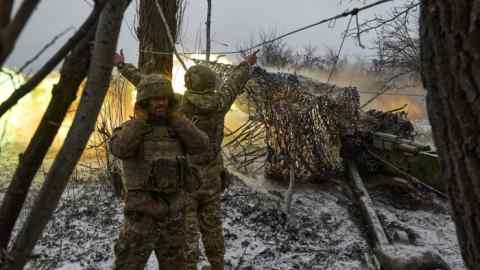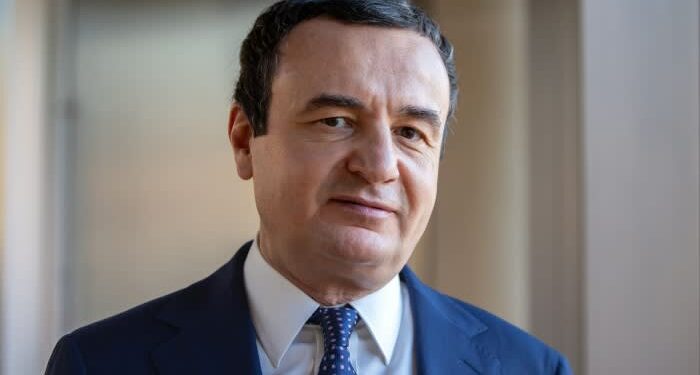Roula Khalaf, Editor of the FT, selects her favourite stories in this weekly newsletter.
Kosovo plans to exercise full sovereignty over its own affairs and will resist western pressure to compromise with former governing power Serbia, the prime minister of the Balkan nation has said.
Defending a series of moves by Pristina that have stripped Belgrade of influence over aspects of life in Kosovo, Albin Kurti told the Financial Times in an interview that his policies were aimed “not against the Serbs, but against Serbia’s illegal activities in Kosovo”.
But western powers fear his tough line will reignite tensions between the two EU hopefuls that have mired them in conflict since the break-up of former Yugoslavia in the 1990s, and threaten Europe’s stability as the continent grapples with the fallout of Russia’s full-scale invasion of Ukraine.
Kosovo, where Serbs make up about 5 per cent of the population, fought a brief but bloody war against Serbia between 1998 and 1999, then unilaterally declared independence from Belgrade in 2008.
Most western countries have recognised Kosovo’s sovereignty, but Serbia vehemently opposes it, and relations between Pristina and Belgrade remain volatile.
Meanwhile, Kosovo’s Serb population has resisted efforts by Pristina to force them to accept Kosovo citizenship, including the use of documents issued by its authorities rather than Serbian papers.
The EU has called for a settlement between Belgrade and Pristina and urged Kurti to refrain from unilateral action.
But the prime minister is unbowed, saying the resolution of issues within Kosovo are a domestic matter and that “there are no . . . security challenges that we cannot manage and control”.
Kurti has introduced measures he said were intended to assert Pristina’s sovereignty.
They include phasing out Serb-issued vehicle licence plates and personal IDs, a crackdown on smuggling and a ban on the Serbian dinar commonly used in Serb areas instead of the euro, which Kosovo unilaterally introduced.
Last month saw the closure of Serbian-run post offices in the north of Kosovo that Kurti said were conducting “illegal activities [such as] falsification of documents” but which Serbs rely on for services such as pension payments from Belgrade.
Several local Serb councils were also disbanded after being elected in polls outside Pristina’s purview, and the government announced plans to reconstruct the homes of former war refugees — predominantly Albanians forced out of Serb areas in recent decades.
In a symbolic move challenging the separation of ethnic Serbs in Kosovo’s north, Kurti has also called for the reopening of a bridge in the municipal capital Mitrovica that has been closed since 2011 to prevent clashes between Serbs in the north of the city and Albanians in the south.
“We want a normal bridge. A normal bridge is an open bridge; the only ones who enjoy a closed bridge are those who still dream of partitioning Kosova,” he said, using the country’s Albanian name. “Europe brought down walls. It’s not OK to insist on a closed bridge.”
Kurti, who faces elections in February, denied he was seeking to score political points among Kosovo’s majority Albanians. “For me this is business as usual,” he said.
Defending his tough strategy, the prime minister noted Belgrade had maintained armed forces at the Kosovo border and refused to sign an international settlement that would in effect guarantee sovereignty for Pristina.
“The most severe security challenges in this century happened during my term,” he said.
A settlement looks increasingly unlikely, analysts said. Kurti has said any dialogue must focus on Kosovo’s sovereignty, a traditional red line for Serb politicians.
The main Serb demand — an ethnic association of Serb municipalities in Kosovo with executive powers and a financial lifeline to Belgrade — remains a non-starter for Pristina despite US and other western countries backing the idea.
“I want no one to be privileged and therefore no one to be discriminated [against],” the premier said. “There can be no super-minority as Belgrade wants.”
US-Kosovo relations could worsen in the event of a Donald Trump victory in November’s US presidential election. The former president’s diplomats have levied harsh criticism against Pristina and developed cordial ties with Serbia even after he left office.
Kurti said he would work with whoever took the White House, noting that Pristina had common ground with a potential Trump administration, including calls for increased European defence spending.
He said the new EU executive settling in this autumn created a chance to refocus on Serbia’s “aggressive” role in the Balkans instead of the recent softer approach towards Belgrade.
Recommended

Serbian President Aleksandar Vučić struck billion-euro deals with European partners this year to exploit Serbia’s lithium resources for electric vehicle production and buy French fighter jets. It has also sold close to €1bn worth of ammunition to western countries that ends up in Ukraine.
Appeasing Serbia was a mistake, warned Kurti, who has accused the country of colluding with Moscow.
Russian state media maintains an office in the Serbian capital, while Belgrade relies on Russia, a permanent member of the UN security council, to help it block Kosovo’s attempts to gain membership of the global body. Serbia has also not joined western sanctions against Russia.
“Security in the region is a victim,” Kurti said. “It is very important [for the] EU to be clear, firm and prompt.”
Source link : http://www.bing.com/news/apiclick.aspx?ref=FexRss&aid=&tid=66f2bc42fe654ac583ae93786662b0b7&url=https%3A%2F%2Fwww.ft.com%2Fcontent%2Fbe7db63b-ebad-4802-a771-2f9e2521b834&c=2614882440713872179&mkt=de-de
Author :
Publish date : 2024-09-23 21:00:00
Copyright for syndicated content belongs to the linked Source.


